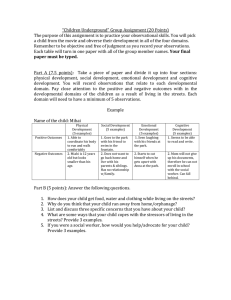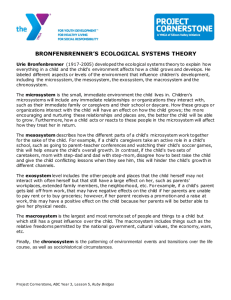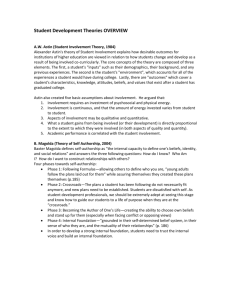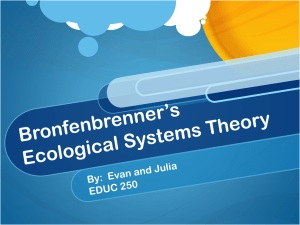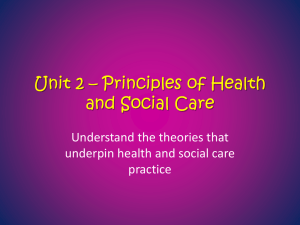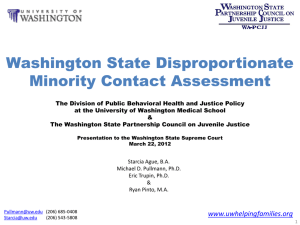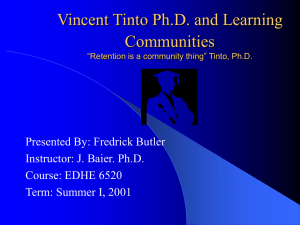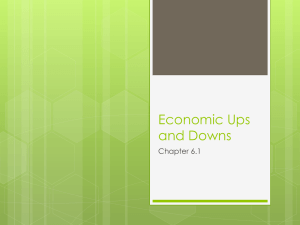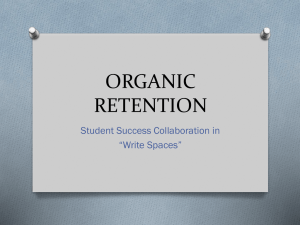The Effect of the Great Recession on Undergraduate Students
advertisement
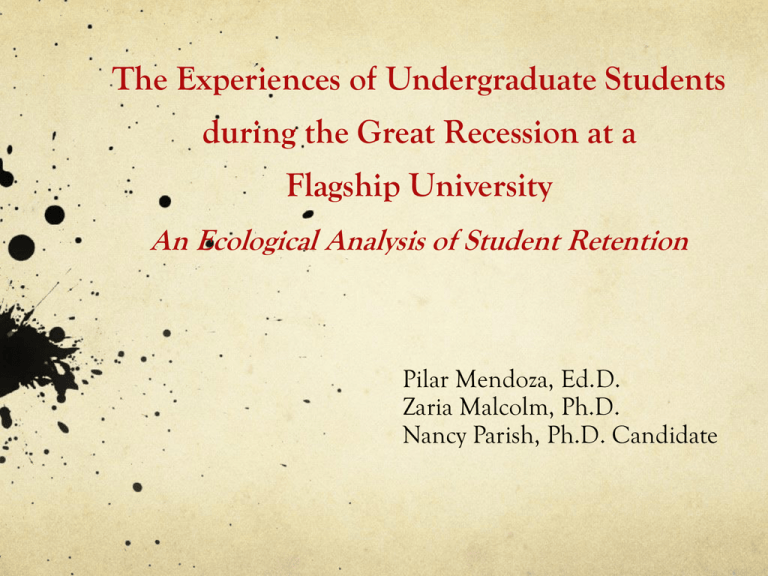
The Experiences of Undergraduate Students during the Great Recession at a Flagship University An Ecological Analysis of Student Retention Pilar Mendoza, Ed.D. Zaria Malcolm, Ph.D. Nancy Parish, Ph.D. Candidate The Great Recession Downturn that began in 2007 has effected many sectors of society (Clarke, 2010) Unemployment and foreclosures has effected many college students’ families 1 in 6 students reportedly forced to change college plans as a result of economic circumstances (College Board, 2009) Purpose of the Study Decades of research shows that college affordability is a significant factor on student retention (Perna, 2006; Chen, 2008; Hossler, Ziskin, Gross, Kim, & Cekic, 2009) The real cost of a college education has climbed almost 30% in the past 10 years (Cellini, 2008) and financial aid is not growing at the same pace as college costs (Long, 2010) Therefore, this study investigated qualitatively how undergraduate students experienced the Great Recession at a flagship university and how this experience relate to their retention Theoretical Perspectives Premise: Students’ success depends on how much they believe they can succeed (Bandura, Barbaranelli, & Caprara, 1996) and on the environmental conditions that enable students to realize their expectations of success (Tinto, 2010) STUDENT X ENVIROMENT = SUCCESS Theoretical Framework: Bronfrenbrenner’s ecological systems theory (1993) and Tinto’s institutional conditions for student retention (2010) Tinto (2010): Institutional Conditions for Retention There are four environmental conditions at the institutional level that allows students to realize their expectations of success: Expectations Feedback Involvement Support Bronfrenbrenner (1993) Ecological Systems Theory accounts for the influences of individuals (person), their interactions with the environment and the responses they provoke from the environment (process), their interactions within immediate settings (context), and changing sociocultural influences on development (time) The elements of person, process, context, and time (PPCT) create a developmental environment unique to an individual that shapes their growth This environment is the result of five nested environmental systems: microsystem, mesosytem, exosystem, macrosystem, and chronosytem Bronfrenbrenner (1993) Microsystem: Face-to-face settings containing the individual such as housing, classes, student organizations, employment, friendships, living situations, family, community, church, etc. Mesosystem: Interactions/processes among microsystems for example, employment influence in classes taking; influence of friendships in social activities, etc. Exosystem: Social setting in which the individual does not have an active role and the individual's immediate context. For example, institutional policies, financial aid, students’ family labor conditions, etc. Macrosystem: Describes the broader political, economical, social and cultural context in which individuals live Chronosystem: The patterning of environmental events and transitions over the life course, as well as socio-historical circumstances (when and where) Bronfrenbrenner (1993) Applied to Campus Environments Graph from Renn (2003) p. 388 Theoretical Framework: The Ecology of Student Retention Bronfrenbrenner (1993) Tinto (2010) Nested Environments Conditions for Student Retention Student Microsystem Self-Expectations and behaviors Mesosystem Feedback Involvement Exosystem Support and Expectations Macrosystem Economic & Political Climate Chronosystem Flagship University in the Great Recession Research Design Participants: 45 undergraduates ~40% African-American ~24% Hispanic ~7% Asian ~29% White ~55% with income above $40,000 Data collection: 30-45 minutes face-to-face open-ended interviews Typological analysis (Hatch, 2002) Interview Protocol Bronfrenbrenner (1993) Nested Environments Tinto (2010) Interview Protocol Conditions for Student Retention Questions Student Self-Expectations and behaviors Aspirations Microsystem Feedback Mesosystem Engagement High school and college experiences Academic and social integration Exosystem Support and Expectations Familial and community environment Financial aid Family support Interactions with faculty and staff Macrosystem Economic & Political Climate Experiences related to the Great Recession Findings Graph 1. The Impact of the Great Recession on Students based on the Study Typologies by the Levels of the Brofenbrenner’s Ecological Systems Theory model (1993) Great Recession Macrosystem Exosystem Family economic/labor conditions Parental Financial Support Anxiety Financial Aid Aspirations Student Time in College Financial Behavior Microsystem Mesosystem Life style Housing Employment Institutional Choice Social & Academic Integration Chronosystem: Great Recession at a Flagship Institution Thank you.
